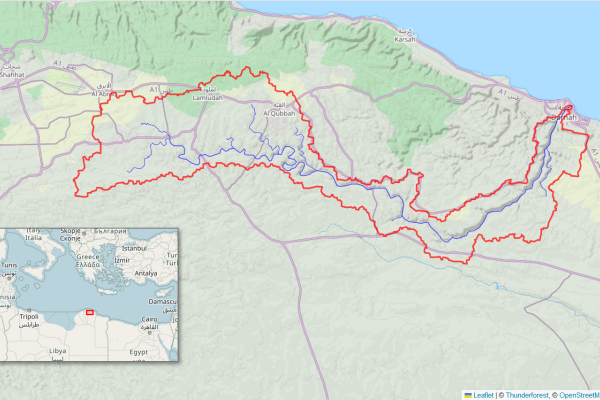Devastating Flood Hits Derna: The Causes and the Aftermath

As the people of Derna cope with the deadliest flood in Africa since 1900, Libyans are on an ongoing search for missing persons. Furthermore, people fear the lasting consequences of such a catastrophe, including homelessness, water-borne illnesses, and more.
This multifold disaster affects over ten thousand people, and the Middle East Studies Center is monitoring the situation as we take account of the full extent of the impact. We will continue sharing updates and point people toward valid information and trusted resources for people who wish to help.
What happened?
Last weekend, people in Derna were generally informed that they should brace for a long and heavy storm, but nobody knew the extent of it, explains Libyan writer, Ayat Mneina. As Storm Daniel hit, it poured a year's worth of water into the river Wadi Derna in a mere 24 hours. Monday morning, the Wadi Derna Dam collapsed, taking the smaller Mansour Dam downriver with it. With their contents combined with stormwater, the dams launched 30 million cubic meters of water into the structurally neglected port city of Derna. The flood demolished entire sections of the city and took thousands of lives and homes with it. As of now, Al-Jazeera estimates 11,300 people dead and another 10,100 missing.
This climactic disaster was exasperated by decades of neglect, unpreparedness, and irresponsibility, says Tarek Megerisi, EFCR Senior Policy Fellow. Derna falls under the legislation of the Libyan National Army, one of the two rival governments dividing the country. Many accredit the failing infrastructure to these political rivalries.
Despite the report shared just last year shared by Sebha University stating that the dams had "a high potential for flood risk", the military government has failed to take necessary action. To many Libyans' outrages, the government allegedly imposed a curfew instead of an evacuation during Storm Daniel, which may have sealed the residents' fates.
"Libya's [political] divisions... transformed a regular environmental disaster into what is now a historic catastrophe," says Megerisi.
How did people respond?
Due to the authoritarian nature of the government, Libyan civil society has been stifled and underdeveloped, further adding to the post-disaster debilitation. Beyond this, lines of communication were down due to the hurricane, says Libyan doctor Ahmad Tarabolsi, from Benghazi. Only one road connects his larger city to Derna, making a mass mobilization of rescue teams difficult.
Despite the report shared just last year shared by Sebha University stating that the dams had "a high potential for flood risk", the military government has failed to take necessary action. To many Libyans' outrages, the government allegedly imposed a curfew
Where to donate?
The Libyan American Association is organizing immediate assistance on the ground in Derna.
The International Federation of Red Cross and Red Crescent has been delivering immediate assistance and rescue teams.
The International Medical Corps has a record of working with the local Ministry of Health and is effectively stationed to deliver medical assistance.
Islamic Relief collects funds across the world to deliver food, bedding, and vital aid to affected people.
